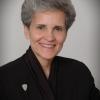"Through the internet, movies and television, they see a very different reality, an image of Europe that is not real. They see that women have more freedom in Europe, and nobody believes there is also a lot of poverty."
Although no placards or public speeches were made, Nigerian sisters kept the counsel of St. Francis of Assisi to "preach the Gospel, and if necessary, use words" in the first consolidated public prayer gesture for their country.
"We do not come to blooming alone. Who are your companions in the bloomtime of Lent?"
From Where I Stand - Since no one else is doing anything about stemming U.S. gun violence, the young people have taken it upon themselves. They lay the responsibility directly at the feet of the politicians who define themselves as the guardians of the democracy.
A religious sister who is the longtime chaplain of the Loyola University Chicago men's basketball team credited the pregame prayer and the players' solid teamwork for the Ramblers' thrilling, last-second 64-62 win over the University of Miami in the NCAA Tournament on March 15.
The space of spiritual direction and accompaniment is so profound! In it I have the grace to touch the sacred space of the people I accompany. I was fortunate to be there for the visit of Pope Francis in Chile — and specifically, in the women's prison in Santiago.
GSR Today - The Burlingame Sisters of Mercy have a long history of openness to people seeking refuge in the United States. In 2018, they are hosting gatherings, prayer services and actions as part of a Year of Solidarity and Outreach to connect with and support people who are victims of hate and discrimination.
It's been nearly 30 years since Sr. Thea Bowman famously declared to a gathering of the U.S. Catholic bishops that her "black self," with all the black songs, dances and traditions she'd imbibed while growing up in Canton, Mississippi, was a gift to the church. In this two-part series, Global Sisters Report is looking at the way black spirituality has shaped religious life for black women, starting with a background on its history.
“I wish I could persuade everyone to be devoted to this glorious saint ... For some years now, I think, I have made some request of him every year on his festival and I have always had it granted. If my petition is in any way ill-directed, he directs it aright for my greater good.”
See for Yourself - Guided by my trusty keychain flashlight and good hearing, I set off in the middle of the night to investigate the source of a wailing alarm.






